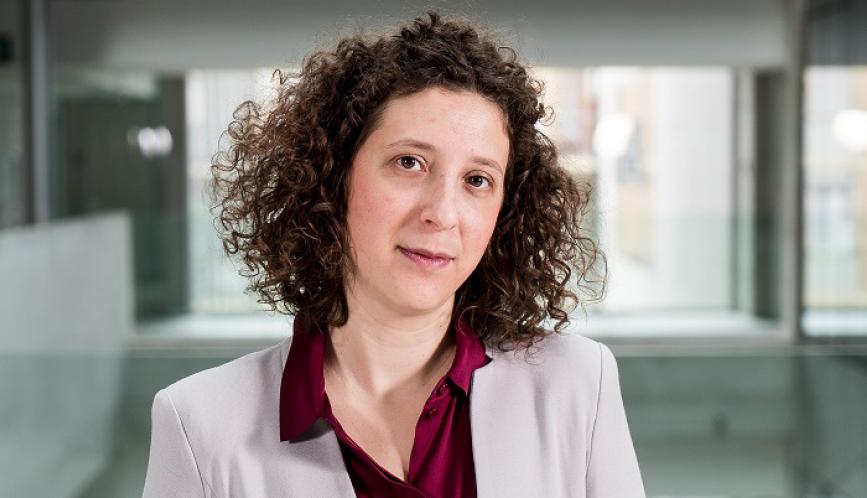Family Inequality network member Pamela Giustinelli is an Assistant Professor in the Department of Economics of Bocconi University in Milan and an affiliate of IGIER and LEAP. Her primary research interests are in measurement, modeling, empirical analysis, and policy implications, of how individuals and groups make consequential economic decisions in the presence of limited information and "Knightian" uncertainty, especially within the family and human capital contexts.
Describe your area of study and how it relates to current policy discussions surrounding inequality.
In a series of related projects which began with my Ph.D. thesis, I have been analyzing the process by which Italian adolescent children and their parents make the choice of high school track, a consequential human capital decision which affects Italian students’ future choices and outcomes in school as well as on the labor market.
In a separate set of projects (joint with Matthew Shapiro at the University of Michigan), I have been studying the main factors driving American older workers’ decision between continuing to work and retiring, with a focus on the role of health.
In two sets of early-stage projects, I am starting to investigate people’s expectations about a range of end-of life outcomes. In the first set of projects (joint with Gabor Kezdi and Sunghee Lee at the University of Michigan), we dig underneath individuals’ longevity expectations to understand how people form expectations about their lifespans, using several sources of data from both the U.S. and multiple European countries. In the second project (joint with Charles Manski at Northwestern and Francesca Molinari at Cornell), we study people’s long-term care expectations for utilization of nursing homes and purchase of long-term care insurance and how such plans are related with the eventuality that individuals develop dementia as they age.
These projects have in common that decision makers must cope with limited information about important aspects of their choice environments and with the uncertain consequences of choosing alternative options. To form beliefs or expectations on which to base their decisions, individuals can gather information and/or can make assumptions about the things that they don’t know. What do people actually do?
Additionally, in most cases the decision does not involve a single individual, but multiple family members and even people outside the family.
My research seeks to understand how the above decisions and similar ones are made and to shed light on the findings’ implications for policy. In my research I investigate how people form beliefs and expectations about the uncertainties characterizing consequential real-world decisions and studies the links among beliefs, expectations, preferences, interactions among decision makers, and behavior. To this end, a part of my efforts focus on developing survey questions to elicit key components of decision-making process that are not directly or unambiguously revealed by observed behavior.
By identifying key mechanisms behind individual's’ beliefs, expectations, and choices, and by quantifying their relative roles, my research can help policy makers to design more effective policies and can inform the current debate on inequality.
For example, in my work on high school track choice in Italy (Giustinelli, 2016), I quantify the impact of potential informational and sensitization campaigns aimed to students, parents, or both on the distribution of choices across existing tracks.
In a related article with my colleague Nicola Pavoni at Bocconi (Giustinelli and Pavoni, 2017), we document that Italian 8th graders approaching choice of the high school track are only partially aware of the schooling alternatives available to them, and have limited confidence in their estimates of the chances of successfully completing alternative high school paths. In the months preceding enrollment into high school, although students learn a great deal about the existing alternatives, their learning process remains incomplete and is concentrated in students’ most preferred alternatives. In addition, we uncover important patterns of heterogeneity across families, whereby different demographic and socioeconomic characteristics such as student’s gender, country of birth, GPA, and parental education and occupation, are associated to different initial knowledge and learning patterns.
Our analysis identifies particular combinations of family profiles and educational alternatives for which informational policies are more likely to reduce inequality by aiding family decision making and, potentially, by improving children’s outcomes.
What areas in the study of inequality are most in need of new research?
In my opinion, an important area of inequality in need of serious research efforts is the measurement of citizens’ perceptions and attitudes about inequality with the aim of studying empirically how such perceptions and attitudes vary in the population and how they relate to citizens’ observed behavior.
More specifically, I am thinking of measurement of things like: (i) the amount and types of inequality perceived by citizens; (ii) citizens’ “mental models” of inequality (i.e., how they think inequality is generated and what consequences they think inequality has on them); (iii) citizens’ preferences (or lack thereof) for inequality.
Given reliable measures of inequality perceptions and attitudes, it would be possible to investigate how those vary across citizens’ characteristics and to ask how they relate to voting and other relevant behaviors. The answers to these questions would have important implications for a range of social and economic policies, particularly those designed to address increasing inequalities.
What advice do you have for emerging scholars in your field?
Rather than a piece of advice, I would like to offer an auspice.
That, notwithstanding the natural and healthy diversity of interests, views, and “credos” about research and the world, scholars stay open to continuous communication and exchange.
That regardless of whether their contributions to the advancement of knowledge are theoretical, empirical, methodological, substantive (or some combinations of those) in nature, they stay pointed to those issues that are most relevant to current and future human societies.



